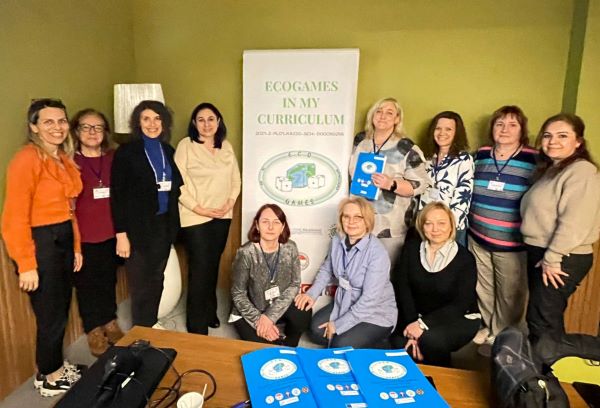Learning through play: Using eco-games in the curriculum

A group of teachers from Italy, Latvia, Poland, Romania, and Turkey came together to create the Erasmus+ project "Eco-games in my curriculum" – a project that combines ecology and educational games across school subjects. We spoke with the coordinators from each country to learn more about their project and its emphasis on student involvement and interdisciplinarity.
Can you give a brief overview of your project?
Sylwia: Our project had two main outcomes: a digital platform with eco-games and a green guidebook with lesson plans. The games are divided into online, indoor, and outdoor categories, all of which focus on ecology and can be integrated across different subjects ranging from mathematics to arts, and physical education (PE). We translated the guidebook into all the project languages, including English, to make it accessible to our colleagues.
Zehra: We used educational games to promote achievement, motivation, fun, and collaboration. The project and games encouraged collaboration between teachers and allowed students to use their knowledge of ecology across different subjects.
How were students involved in the project?
Marusca: We involved 4-8 students per partner. Students designed some of the games and played them as game masters for younger students. It was interesting to not only see the collaboration between subjects but also between grades.
Baiba: Our school is a small rural school in Latvia and all students were actively involved. For one of the games - Nature twists and turns - students and teachers created more than 40 questions for three levels of knowledge. Students created the gameboard during art lessons and they translated questions in English class.
Sylwia: Students loved the project, meeting other students during exchanges or online meetings, and improving their English language skills.
What challenges did you face, and how did you address them?
Zehra: We had good cooperation, but time management was a challenge. We are busy teachers with other projects and tasks, so we often worked on the project in the evenings. Coordinating with other teachers who were not directly involved was often difficult. We had to be very organised and communicate effectively to make sure everyone was on the same page.
Marusca: While we had some difficulties, we were dedicated to our work, helped each other, and trusted each other. We knew that we were working towards a common goal, and that motivated us to keep going.
Crina: Sometimes, it was difficult to adapt the rules and content of the games to be relevant for all countries as well as the digital environment. We also needed to ensure that technological equipment was available to implement the games.
Sylwia: Across cultures, I did not notice any difficulties. We really loved meeting new cultures and traditions and each school hosted us very kindly. We felt like we were part of one big family.
How did you disseminate your results?
Crina: Together with my students, I created a website to disseminate the results of the project. The website won first place in our school competition and fourth place nationally.
Zehra: In Turkey, I visited local governors and was honoured with rewards and certificates. This was a great way to share our project with the wider community and get recognition for our hard work.
Sylwia: I presented the project results at a neighbouring school in Poland. Teachers asked a lot of questions and were impressed with the games and lesson plans. We also disseminated our project on the school website, the city website and its Facebook profile.
Marusca: As an Erasmus+ ambassador, I attended seminars and shared our project as an example of what teachers can do.
Baiba: After each mobility, we organised presentations at school for students, teachers, and parents, and wrote an article in our local newspaper.
What is one thing everyone could learn from your project?
Sylwia: Our actions can have a real impact on the environment, and ecology is everywhere, not just in biology.
Marusca: You need to dare to explore unfamiliar fields and take risks. The connection between subjects and the collaboration between teachers are what make the difference.
Baiba: Students all around the world share the same concerns and passions. Despite language barriers, they can come together and work effectively.
Zehra: Games are the best way to teach something.
Check out the games and lesson plans on the project website: IO1 | Erasmus Ecogames.
Additional information
-
Target audience ISCED:Primary education (ISCED 1)Lower secondary education (ISCED 2)Upper secondary education (ISCED 3)
